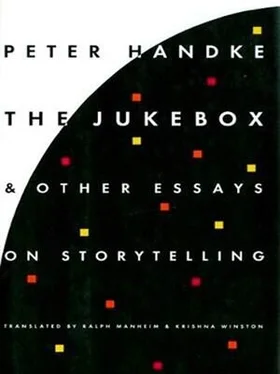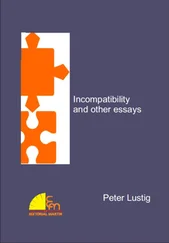It had seemed to him that such a writing process was appropriate not merely to the particular subject matter but also to the times themselves. Didn’t the narrative forms of previous eras — their consistency, their gestures of conjuring up and mastering (strangers’ destinies), their claim to totality, as amateurish as it was naïve — when employed in modern books strike him nowadays as mere bluster? Varied approximations, some minor, some major, and in permeable forms, instead of the standard imprisoning forms, were what he felt books should be now, precisely because of his most complete, intense, unifying experiences with objects: preserving distance; circumscribing; sketching in; flirting around — giving your subject a protective escort from the sidelines. And now, as he aimlessly checked out trails in the savanna, suddenly an entirely new rhythm sprang up in him, not an alternating, sporadic one, but a single, steady one, and, above all, one that, instead of circling and flirting around, went straight and with complete seriousness in medias res: the rhythm of narrative. At first he experienced everything he encountered as he went along as a component of the narrative; whatever he took in was promptly narrated inside him; moments in the present took place in the narrative past, and not as in dreams but, without any fuss, as mere assertions, short and sweet as the moment itself: “Thistles had blown into the wire fence. An older man with a plastic bag bent down for a mushroom. A dog hopped by on three legs and made one think of a deer; its coat was yellow, its face white; gray-blue smoke wafted over the scene from a stone cottage. The seedpods rustling in the only tree standing sounded like matchboxes being shaken. From the Duero leaped fish, the wind-blown waves upstream had caps of foam, and on the other bank the water lapped the foot of the cliffs. In the train from Zaragoza the lights were already lit, and a handful of people sat in the carriages …”
But then this quiet narration of the present also carried over into his impending “essay,” conceived as varied and playful; it became transformed, even before the first sentence was written, into a narrative so compelling and powerful that all other forms promptly faded to insignificance. That did not seem terrible to him, but overwhelmingly splendid; for in the rhythm of this narration he heard the voice of warmth-giving imagination, in which he had continued to believe, though it all too seldom touched his inner heart: he believed in it precisely because of the stillness it brought, even in the midst of deafening racket; the stillness of nature, however far outside, was then nothing by comparison. And the characteristic feature of imagination was that in conjunction with its images the place and the locale where he would write his narrative appeared. True, there had been times in the past when he had felt a similar urge, but at such times he had relocated a birch in Cologne to Indianapolis as a cypress, or a cow path in Salzburg to Yugoslavia, or the place where he was writing had been consigned to the background as something unimportant; but this time Soria was to appear as Soria (perhaps also with Burgos, and also with Vitoria, where an old native had greeted him before he said anything), and would be as much the subject matter of the narrative as the jukebox.
Until far into the night he continued his observations in narrative form, though by now it had become a form of torture — literally every petty detail (the passerby with a toothpick in his mouth, the name Benita Soria Verde on a gravestone, the poet’s elm, weighted with stones and concrete in honor of Antonio Machado, the missing letters in the HOTEL sign) imposed itself on him and wanted to be narrated. This was no longer the compelling, warming power of imagery carrying him along, but clearly a cold compulsion, ascending from his heart to his head, a senseless, repeated hurling of himself against a gate long since closed, and he wondered whether narration, which had first seemed divine, hadn’t been a snare and a delusion — an expression of his fear in the face of all the isolated, unconnected phenomena? An escape? The result of cowardice? — But was a man walking along with a toothpick between his lips, in the winter, on the meseta of Castile, his nodded response to a greeting, really so insignificant? — Be that as it might: he did not want to know in advance the first sentence with which he would begin on the morrow; in the past, whenever he had hammered out the first sentence, he had promptly found himself blocked when it came to the second. — On the other hand: away with all such patterns! — And so on …
The morning of the following day. The table at the window of the hotel room. Empty plastic bags blowing across the rock-strewn landscape, catching here and there on the thistles. On the horizon, an escarpment shaped like a ski jump, with a rain-bearing mushroom cloud over the approach ramp. Closing his eyes. Jamming a wad of paper into the cracks around the window through which the wind whistles its worst. Closing his eyes again. Pulling out the table drawer whose handle rattles as soon as he begins to write. Closing his eyes for the third time. Howls of distress. Opening the window: a small black dog right beneath it, hitched to the foundation, drenched with rain as only a dog can be drenched; its wails, which briefly fall silent now and then, accompanied by clouds of breath visibly puffed out into the steppe. Aullar was the Spanish word for “howl.” Closing his eyes for the fourth time.
On the ride from Logroño to Zaragoza he had seen the stone cubes of the vintners’ huts out in the winter-deserted vineyards of the Ebro Valley. In the region he came from, one could also see such huts along the paths that led through the grain fields, though built of wood, and the size of a plank shed. On the inside they also looked like a shed, with the light coming only through the chinks between the boards and the knotholes, clumps of grass on the floor, stinging nettles in the corners, growing luxuriantly between the harvest tools leaning there. And yet each of the huts on the few acres his grandfather tenant-farmed felt to him like a realm unto itself. As a rule, an elder grew nearby, its crown providing shade for this thing set out in the middle of the field, and its arching branches forcing their way into the interior of the hut. And there was just room enough for a small table and a bench, which could also be set outside by the elder. Wrapped in cloths to keep fresh and be protected from insects, the jug of cider and some cake for a snack. In the domain of these sheds he had felt more at home than ever in solidly built houses. (In such houses, a comparable sense of being in the right place had come over him at most when he glanced into a windowless storage room or stood on the threshold between inside and outside, where one was still safe indoors while snow and rain from outside blew lightly against one.) Yet he viewed the field huts less as refuges than as places of rest or peace. Later it was enough simply to glimpse in his region a light gray, weathered storage shed, blown crooked by the wind, off in the distance by a fallow field, in passing; he would feel his heart leap up and dash to it and be at home in the hut for a moment, along with the flies of summer, the wasps of autumn, and the coldness of rusting chains in winter.
The huts back home had been gone for a long time. Only the much larger barns, used exclusively for hay storage, still existed. But long ago, at a time when the huts were still there, the domestic or localized magic they held for him had been transferred to jukeboxes. Even as an adolescent, with his parents, he didn’t go to the inn or to have a soda, but to the “Wurlitzer” (“Wurlitzer is Jukebox” was the advertising slogan), to listen to records. What he had described as his sense of having arrived and feeling sheltered, each time only fleetingly, in the realm of the field huts was literally true of the music boxes as well. Yet the external form of the various devices and even the selections they offered meant at first less than the particular sound emanating from them. This sound did not come from above, as from the radio that stood at home in the corner with the shrine, but from underground, and also, although the volume might be the same, instead of from the usual tinny box, from an inner space whose vibrations filled the room. It was as if it were not an automatic device but rather an additional instrument that imbued the music — though only a certain kind of music, as he realized in retrospect — with its underlying sound, comparable perhaps to the rattling of a train, when it suddenly becomes, as the train passes over an iron bridge, a primeval thunder. Much later, a child was standing one time by such a jukebox (it was playing Madonna’s “Like a Prayer,” his own selection), the child still so small that the entire force of the loudspeaker down below was directed at his body. The child was listening, all ears, all solemn, all absorbed, while his parents had already reached the door, were ready to leave, calling to the child again and again, in between smiling at his behavior, as if to apologize for their offspring to the other patrons, until the song had died away and the child, still solemn and reverent, walked past his father and mother onto the street. (Did this suggest that the obelisk-shaped jukeboxes’ lack of success had less to do with their unusual appearance than with the fact that the music was directed upward, toward the ceiling?)
Читать дальше












